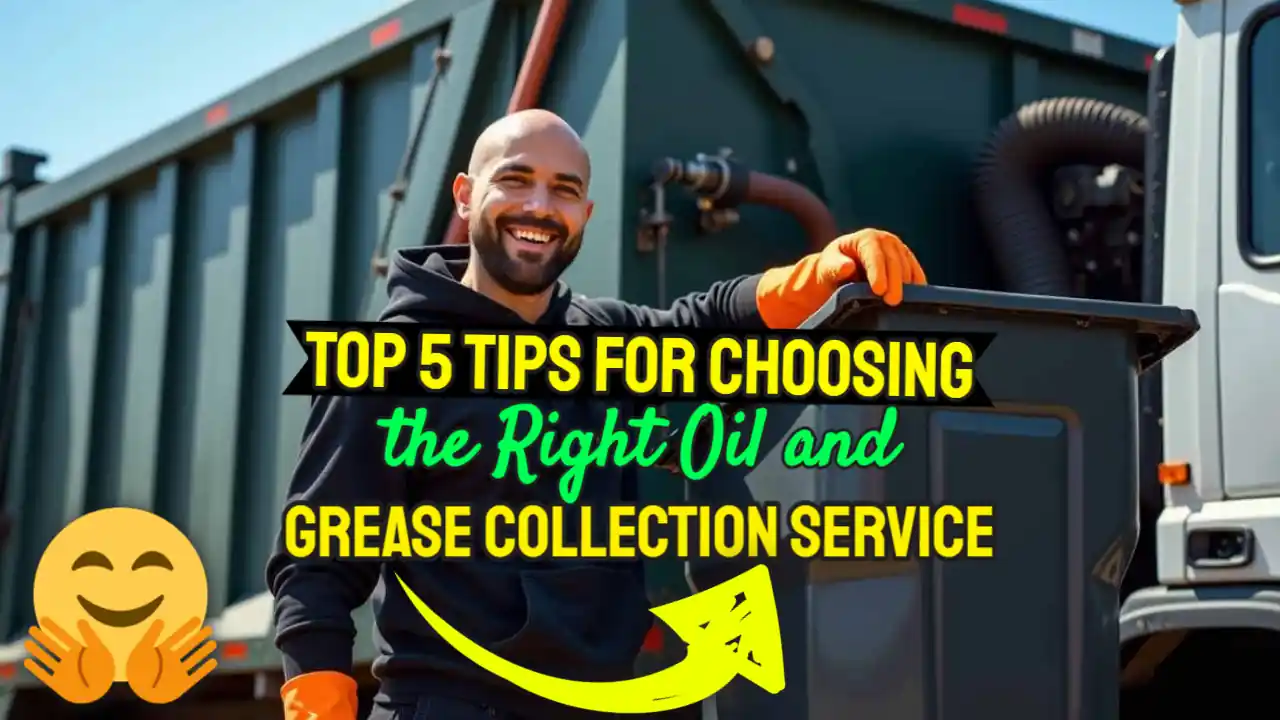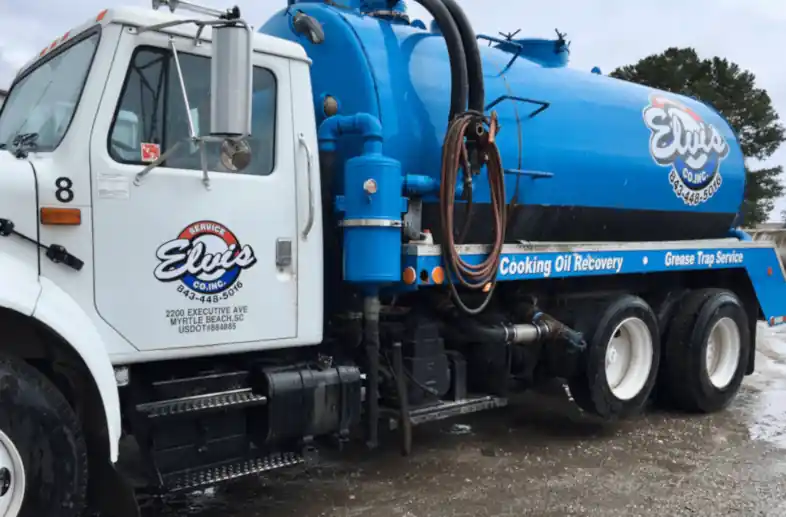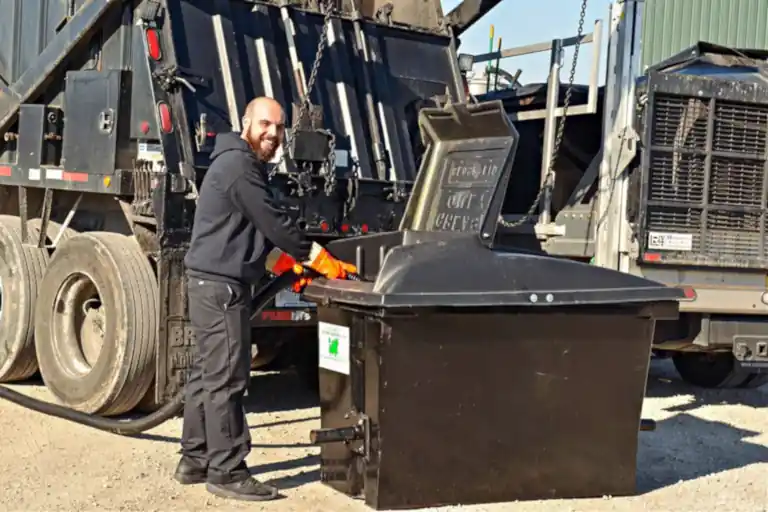Top 5 Pointers for Successfully Selecting the Best Grease and Oil Collection Service
Key Takeaways
- Choose a service that aligns with your business operations to ensure efficiency and avoid disruptions.
- Opt for companies with strong environmental practices to support sustainability goals.
- Ensure the service provider complies with local and national regulations to avoid legal issues.
- Research company reputation through online reviews, testimonials, and industry peers.
- Verify the company's licenses and certifications for waste transport and disposal.
Why Your Choice of Oil and Grease Collection Service Matters
Choosing the right oil and grease collection service is more than just a logistical decision. It can significantly impact your business operations, your environmental footprint, and your compliance with legal regulations. This choice is a critical component of your business strategy, particularly if you want to promote sustainability and efficiency.

Impact on Business Operations
The oil and grease collection service you choose can directly affect your day-to-day business activities. Imagine a scenario where your service provider is unreliable, leading to missed collections. This could result in overflowing waste containers, disrupting your operations and potentially causing health hazards. Therefore, selecting a dependable service is crucial.
Moreover, a good collection service can help streamline your waste management processes. With regular pickups and efficient disposal methods, your business can operate smoothly without worrying about waste buildup. This not only saves time but also reduces stress on your management team, allowing them to focus on core business activities.
Environmental Responsibility
Environmental responsibility is no longer just a buzzword; it's a necessity. Businesses today are expected to contribute to sustainability efforts, and choosing the right oil and grease collection service is a step in that direction. Look for companies that prioritize eco-friendly disposal methods and have a clear commitment to recycling and reducing carbon footprints.
For instance, some collection services offer recycling programs that convert waste oil into biodiesel, a renewable energy source. By partnering with such services, your business not only reduces its environmental impact but also supports the circular economy. This can enhance your brand's reputation as a green business, attracting environmentally conscious customers and partners.
Legal Compliance and Regulations
Failure to comply with waste management regulations can lead to hefty fines and legal issues. Different regions have specific laws governing the disposal of oil and grease, and it's essential to choose a service that understands and adheres to these regulations. For businesses in London, finding the right waste management company ensures that your business stays on the right side of the law.
Besides that, compliance with regulations often means that the service provider has undergone rigorous checks and holds the necessary certifications. This is a good indicator of their reliability and professionalism. By ensuring compliance, you protect your business from potential legal troubles and demonstrate a commitment to lawful operations.
“Evergreen Grease | Grease Disposal …” from evergreengrease.com and used with no modifications.
Researching the Company's Reputation
Before signing a contract with any oil and grease collection service, it's crucial to research their reputation. A company's track record can tell you a lot about their reliability, efficiency, and customer service. This step is vital in ensuring you choose a service that aligns with your business needs. For those in the UK, you might find it helpful to refer to a guide to finding waste management companies in London as part of your research.
“A good reputation is more valuable than money.” – Publilius Syrus. Learn how maintaining a good reputation in waste management can benefit your business.
In today's digital age, information is at your fingertips, making it easier than ever to conduct thorough research.
Checking Online Reviews and Testimonials
Start by checking online reviews and testimonials. Websites like Google Reviews and Yelp can provide insights into the experiences of other businesses with the service provider. Look for patterns in the feedback. Consistent complaints about missed pickups or poor customer service are red flags. Additionally, you can explore the list of US zero waste companies to find reputable service providers committed to sustainability.
Conversely, a series of positive reviews highlighting reliability and excellent service are good indicators of a trustworthy company. Remember, though, to take each review with a grain of salt and look at the overall trend rather than individual comments. For more insights, you might want to explore this guide to finding waste management companies.
Understanding Certification Standards
When selecting an oil and grease collection service, understanding certification standards is crucial. Certifications serve as a guarantee that the company adheres to industry norms and provides quality services. They are a testament to the company's commitment to safe and responsible waste management.
For example, the ISO 14001 certification focuses on effective environmental management systems. A service provider with this certification demonstrates a commitment to minimizing environmental impact. Additionally, certifications like the R2 Standard highlight responsible recycling practices, ensuring that the company handles waste in an environmentally friendly manner.
Local and National Regulatory Compliance
Compliance with local and national regulations is non-negotiable when choosing a waste collection service. Different regions have specific laws regarding waste disposal, and non-compliance can lead to significant penalties. It's essential to verify that your service provider is aware of and adheres to these regulations.
Check if the company holds the necessary permits for waste transport and disposal. These permits indicate that they have met the regulatory requirements and are authorized to handle waste in your area. By ensuring compliance, you protect your business from potential legal issues and demonstrate a commitment to lawful operations.
Evaluating the Range of Services Offered
Not all oil and grease collection services are created equal. The range of services offered can vary significantly from one provider to another. Evaluating these services is a critical step in ensuring that your chosen provider meets all your business needs. To make an informed decision, you might consider consulting a guide to finding waste management companies that can offer comprehensive solutions.
Consider what your business requires beyond basic collection. Some companies offer comprehensive waste management solutions, including recycling, emergency response, and even consultancy services to help optimize your waste management processes.
Look for providers that offer flexibility in their services. A company that can adapt to your changing needs as your business grows or faces new challenges is invaluable. For instance, consider exploring a guide to finding waste management companies that offer adaptable solutions.

Regular Collection Schedules
One of the most critical aspects of a waste collection service is the regularity of their collection schedules. Consistent pickups prevent waste buildup, ensuring that your business operations run smoothly. When evaluating a service provider, inquire about their collection frequency and flexibility.
Some providers offer customizable schedules to suit your business's specific needs. Whether you require daily, weekly, or monthly collections, a good service provider should accommodate your preferences. Consistent and reliable collections are essential for maintaining a clean and efficient work environment.
Emergency Spill Response Availability
Accidents happen, and when they do, having a service provider with emergency spill response capabilities is crucial. A quick response to spills can prevent environmental damage and minimize disruptions to your business operations.
Ask potential service providers about their emergency response times and procedures. A company that can swiftly handle spills and other emergencies demonstrates professionalism and preparedness, giving you peace of mind knowing that unexpected situations will be managed efficiently.
Additional Waste Management Services
Beyond oil and grease collection, some providers offer additional waste management services that can benefit your business. These services might include hazardous waste disposal, recycling programs, or consultancy services to improve your waste management practices.
By choosing a provider that offers a comprehensive range of services, you can streamline your waste management processes and potentially reduce costs by consolidating services with a single provider. This holistic approach to waste management can improve efficiency and sustainability in your business operations.
Considering Environmental Practices
Environmental sustainability is a growing concern for businesses and consumers alike. When choosing a collection service, it's essential to consider their environmental practices and commitment to sustainability.
Recycling and Reuse Initiatives
Recycling and reuse initiatives are vital components of sustainable waste management. Look for service providers that prioritize these practices, turning waste into valuable resources. For example, some companies convert waste oil into biodiesel, a renewable energy source.

Eco-friendly Disposal Methods
Providers that use advanced technologies and processes to minimize waste and emissions demonstrate a commitment to sustainability. By choosing such a provider, you align your business with environmentally responsible practices, supporting global efforts to reduce pollution and conserve resources.
Commitment to Reducing Carbon Footprint
Reducing carbon footprint is a key goal for many businesses aiming to improve their sustainability. When selecting a collection service, consider their efforts to minimize carbon emissions and enhance energy efficiency. For more information, check out this infographic on carbon footprint.
By partnering with a company that shares your commitment to reducing carbon emissions, you contribute to a more sustainable future while enhancing your brand's environmental credentials.
Analyzing Cost and Contract Terms
When selecting an oil and grease collection service, understanding the cost and contract terms is essential. These factors can significantly impact your business's financial health and operational efficiency. Therefore, it's crucial to analyze these aspects carefully before making a decision.
Transparent Pricing Structures
Transparency in pricing is a hallmark of a reputable service provider. Look for companies that offer clear and straightforward pricing structures. This means no hidden fees or unexpected charges. A transparent pricing model allows you to budget effectively and avoid unpleasant surprises.
Before committing, request a detailed breakdown of all costs involved. This should include collection fees, disposal charges, and any additional services you might require. A company that willingly provides this information demonstrates honesty and integrity, making them a trustworthy partner.
Flexible Contract Options
Flexibility in contract terms is another important consideration. Your business needs might change over time, and a rigid contract could become a hindrance. Look for providers that offer flexible contract options, allowing you to adjust the terms as your requirements evolve.
Some companies offer month-to-month contracts, while others may provide annual agreements with options for adjustments. Choose a provider that offers the flexibility you need to adapt to changing business circumstances without incurring penalties or additional costs.
Value-added Services
Value-added services can enhance your waste management strategy and provide additional benefits to your business. These services might include waste audits, consultancy services, or training programs for your staff on sustainable waste practices.
By choosing a provider that offers value-added services, you can optimize your waste management processes and potentially reduce costs. These services can also help you achieve your sustainability goals more effectively, enhancing your business's environmental performance.

“Recycling Restaurant Grease …” from elvisservicecompany.com and used with no modifications.
Frequently Asked Questions
When selecting an oil and grease collection service, you may have several questions. Here are some common queries and their answers to help guide your decision-making process.
What certifications should an oil and grease collection service have?
- ISO 14001 for environmental management systems
- R2 Standard for responsible recycling practices
- Local and national waste transport and disposal permits
These certifications ensure that the service provider adheres to industry standards and regulations, guaranteeing quality and responsible waste management.
How often should I schedule oil and grease collection?
The frequency of collection depends on your business's specific needs. For high-volume operations, daily or weekly collections might be necessary. Smaller businesses might require monthly pickups. Consult with your service provider to determine the best schedule for your needs, ensuring efficient waste management without unnecessary costs.
Is emergency service important when choosing a collection service?
Yes, emergency service is crucial for managing unexpected spills or accidents. A provider with quick response times can prevent environmental damage and minimize disruptions to your operations. Ensure that your chosen service offers reliable emergency support to address unforeseen situations promptly.
How can I verify a company's environmental practices?
To verify a company's environmental practices, start by reviewing their certifications and permits. Additionally, ask for information on their disposal methods and recycling initiatives. A reputable provider will be transparent about their practices and may even offer tours of their facilities or provide documentation to demonstrate their commitment to sustainability.
Another way to assess their environmental practices is by reading reviews and testimonials from other businesses. Look for feedback on the company's eco-friendly initiatives and how they contribute to sustainability efforts.
What are common pitfalls when signing a contract with these services?
One common pitfall is not thoroughly reading and understanding the contract terms. Ensure that you review all clauses, especially those related to pricing, service frequency, and termination conditions. Be wary of hidden fees or penalties for contract adjustments.
Another pitfall is choosing a provider based solely on cost. While affordability is important, it should not come at the expense of quality and reliability. Always consider the provider's reputation, environmental practices, and service offerings alongside their pricing.
Lastly, failing to verify the provider's certifications and compliance with regulations can lead to legal issues. Ensure that your chosen service holds the necessary permits and certifications to operate legally and responsibly.
By carefully considering these factors and asking the right questions, you can select an oil and grease collection service that meets your business's needs and supports your sustainability goals.







